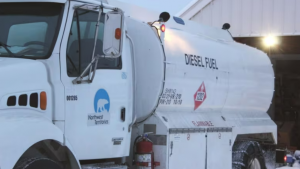N.W.T. oil heating carbon tax exemption kicks in as carbon price rises nationally

Starting today, people in the Northwest Territories will pay more for gasoline and diesel at the pumps, and less for diesel to heat their homes.
On Monday, the federal carbon tax increased from $65 per tonne to $80. With the increase, consumers will pay 3 cents more per litre of gasoline, and 4 cents more per litre of diesel.
The N.W.T. government’s heating fuel exemption also came into effect on Monday. People in the territory who heat their homes with diesel will not pay the carbon tax at all on that fuel until March 31, 2027 — though diesel for cars will continue to be subject to the tax.
Residents who heat their homes with other fuels like propane or natural gas will continue to pay the carbon tax at the new increased rates.
To offset the loss in carbon tax revenue from the exemption, the N.W.T. government is also reducing quarterly carbon tax cost-of-living offset payments to residents. Depending on where you live in the territory, carbon offset payments will go down by $100 to $200 dollars total for the first year of the heating oil exemption.
While the home heating exemption is starting on April 1, residents won’t see the drop in their quarterly cost-of-living offset payments until July of 2024, when the first quarterly instalment for the 2024-2025 fiscal year is paid out.
The Northwest Territories government administers its own carbon tax. For the provinces which fall under the federal carbon tax, the heating oil exemption to the carbon tax came into effect in November of 2023.
Related stories from around the North:
Canada: N.W.T. announces carbon tax exemption on diesel for home heating, CBC News
Greenland: Climate change accelerating ice loss from peripheral glaciers, Eye on the Arctic
Norway: Will the green transition be the new economic motor in the Arctic?, Eye on the Arctic
Russia: More Russian Arctic oil via Murmansk redirects to India, The Independent Barents Observer
Sweden: Sweden’s climate policies closer to reaching goals, Radio Sweden
United States: Bering Sea ice at lowest extent in at least 5,500 years, study says, Alaska Public Media



